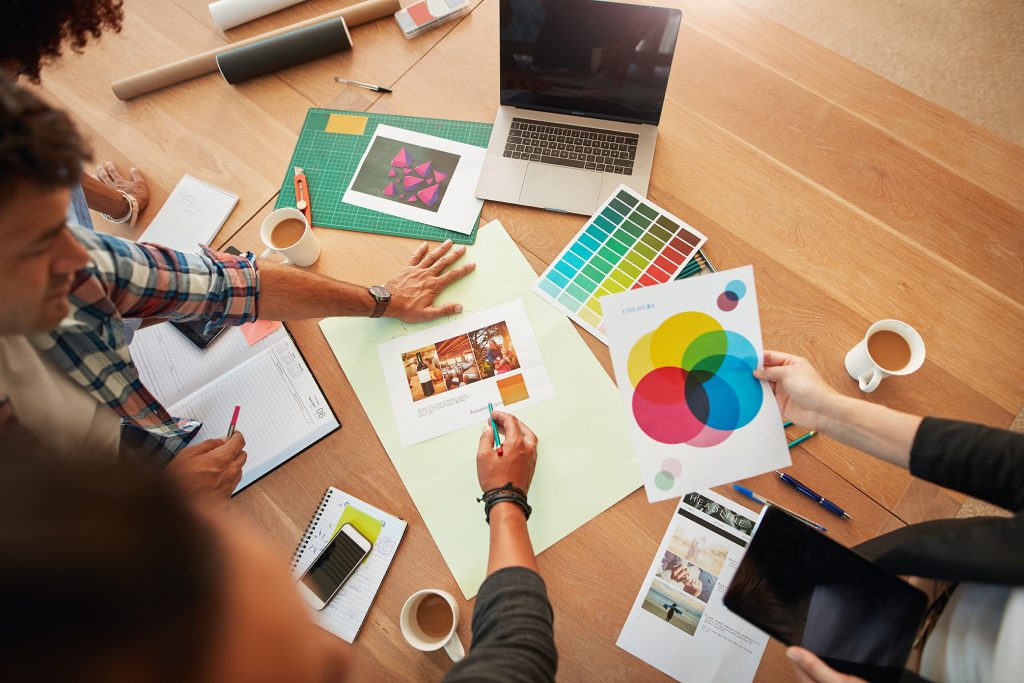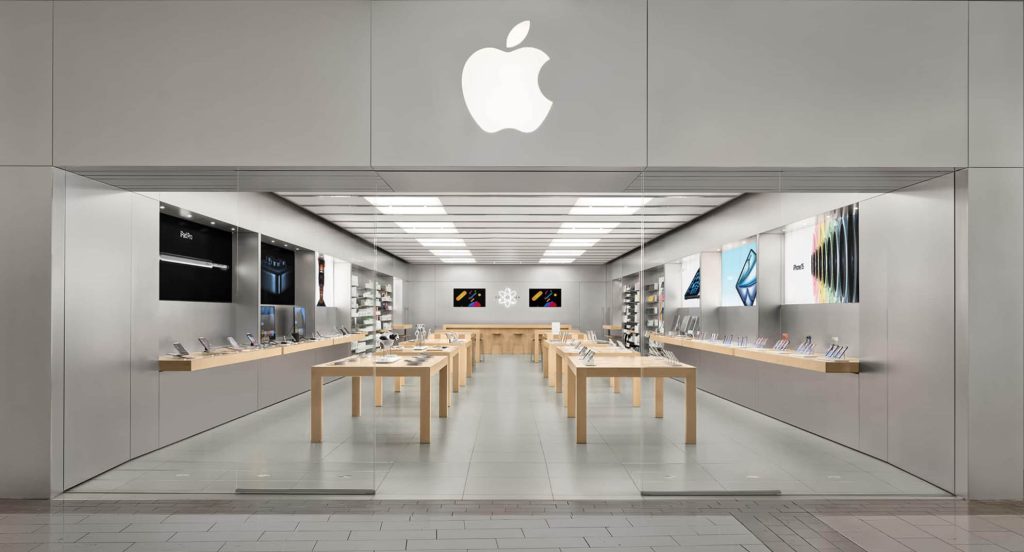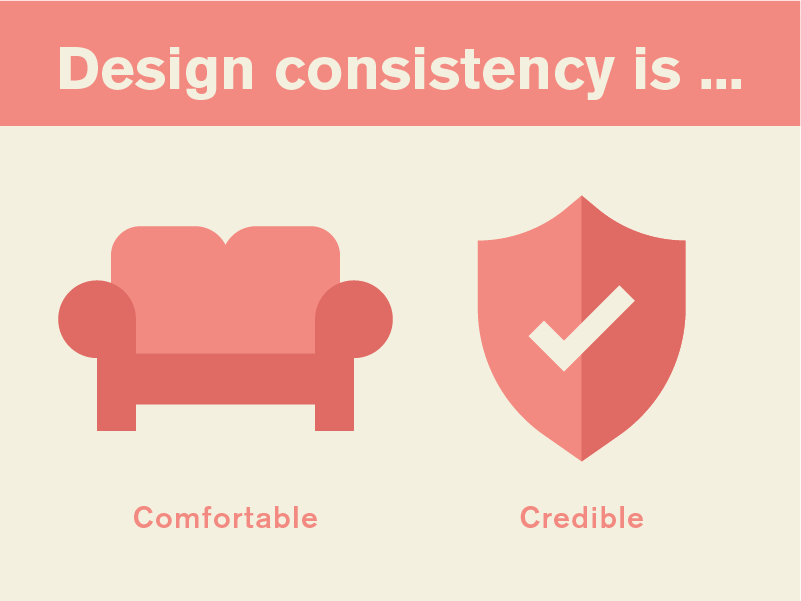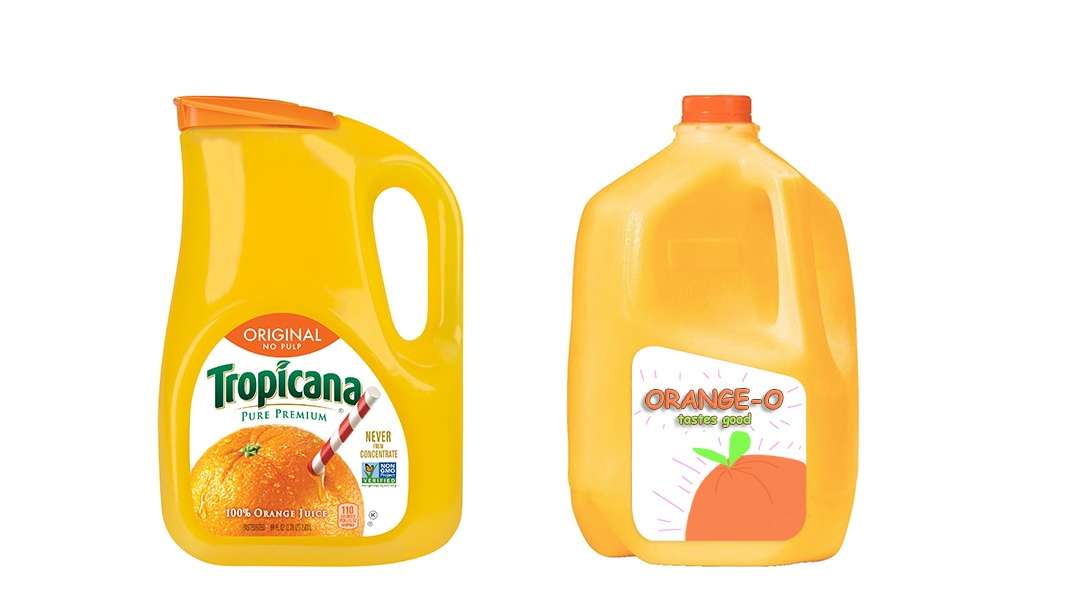Intro to Graphic Design
Graphic design for business isn’t just about making things look good — it’s a driving force behind how businesses communicate, connect, and convert. It’s the engine of the design process, blending strategy, creativity, and technical skill to create designs that are not only beautiful but purposeful.
From websites and digital platforms to physical spaces, graphic design shows up everywhere — including industries like construction, where visuals need to work as hard as they look. Graphic Designers use elements like color, typography, and imagery to tell stories, solve problems, and shape user experiences that actually work.
The design process is layered — from early research and concept development to polished execution. Every stage matters. And while tools like Adobe Creative Suite help bring visions to life, it’s the collaboration between designers and development teams that turns great ideas into a seamless final product.
In today’s crowded landscape, strong graphic design helps businesses cut through the noise, build trust, and stand out. It’s not just decoration — it’s differentiation. And when the design for business is done right, the results speak for themselves.
- Good design drives real results — Strategic, high-quality design can measurably improve conversions, boost revenue, and deliver a strong ROI, not just aesthetic appeal.
- First impressions matter — Great design grabs attention, sets expectations, and instantly elevates how your brand is perceived in competitive markets.
- Consistency builds memorability and trust — A unified visual identity across all platforms helps your brand stand out and feel reliable to your audience.
- Design simplifies communication — Effective design makes complex ideas easier to understand, whether through websites, motion graphics, or visual storytelling.
- Design systems save time and scale effortlessly — Investing in a reusable, brand-aligned design system ensures consistency, speeds up production, and reduces long-term costs.

Why Graphic Design Is Essential for Business Success Today
Companies that neglect it stick out for all the wrong reasons. But here’s the catch: with design tools more accessible than ever, the world is now flooded with generic, entry-level work. Just showing up with a Fiverr logo and calling it a day won’t cut it.
To make a real impact, your design for business needs to do more than just look good — it needs to work. That means turning heads, building trust, simplifying communication, and delivering measurable results. Whether you’re launching a brand or scaling one, the difference between blending in and standing out often comes down to design.
This is why companies like Nike shell out around $3.5 billion a year promoting their brand — yes, billion with a “B.” And they’ve done it consistently for the past four years. So, why pour so much into design? It’s not because some guy named Joe said it’s a good idea. It’s because creative design delivers results — measurable, long-term, brand-building results that keep Nike ahead of the game.
Table of Contents
How Creative Design Delivers Measurable Business Results
Much of design’s value lives in the qualitative — things like creating empathy, building trust, and delivering a great user experience. These benefits are powerful and shouldn’t be overlooked. In fact, most companies already recognize how these qualities positively impact their brand and business. Otherwise, global brands like Nike wouldn’t invest so heavily in design.
Still, some remain skeptical, feeling these benefits aren’t backed by measurable reasoning.
Simply put, companies know that design adds value, but they’re often unsure how it ties directly to revenue. Fortunately, it’s easier than you’d think to measure the benefits of design. Good design can enhance operational efficiencies by streamlining processes, reducing costs, and simplifying workflows, ultimately resulting in greater performance for both businesses and creators.
Let’s look at a quick example of the value of design for business.
Imagine your friend Susan runs a small shop selling home automation. Her website hasn’t been updated in over a decade and no longer reflects the sophistication of her business. She wants to partner with a creative web design agency to modernize it — but she’s unsure how a redesign translates to actual dollars.
Now let’s say the agency delivers a new website with clean, on-brand aesthetics and a seamless user experience, making it easier for customers to engage with her services — while also elevating brand confidence. Based on similar sites in her industry, this could result in a modest 0.5% increase in conversions. According to the chart above, that could mean a projected $200,000 in additional revenue over the next year. Not bad for a design refresh. Various team members, such as designers and developers, contribute to the success of the design project, enhancing its overall impact.
Of course, this is a simplified example. Actual results depend on many factors — the scope of the design work, the industry, and current market conditions. But it’s clear that graphic design benefits can impact your business in real, measurable ways.
Now, let’s explore the specific qualities that make creative graphic design so impactful for business.
The Role of Creative Design in First Impressions
Having a superior or unique offering is critical for a business to stand above and beyond the competition — and that’s something your customers will always value. But when it comes to standing out in a crowded market, creative graphic design for business is the undisputed king.

It’s a tried-and-true concept: first impressions matter, especially on the web. In fact, you’ve got about half a second to capture someone’s attention. In that moment, customers are already deciding whether your brand’s visual appeal is strong enough to keep them engaged.

This is where effective communication in design makes all the difference. Think of it like passing by a new store — most customers won’t walk in and buy something right away. They size up the visuals, the vibe, and whether it feels worth stepping inside.Naturally, if a customer is impressed, they will decide to give it a shot. Apple is a masterclass in this. From their retail spaces to their product design, everything invites interaction. There’s nothing jarring, nothing off-brand just smooth, seamless, intentional design. It’s so well-executed, it feels invisible. And that’s exactly the point.
Delivering that kind of strong first impression through great design for business does two things:
- Great design nets you a positive, memorable first impression.
- That impression makes your business seem more reliable, which makes customers more likely to establish trust and give you a chance.
These two outcomes are everything. Because if your brand isn’t memorable — or doesn’t feel trustworthy — chances are you won’t be the first pick when it’s time to choose a partner, product, or service.
Think of the difference between walking into a 4-star hotel like the Ritz Carlton versus a Courtyard Marriott. Both may deliver what you need, but your expectations are much higher for the Ritz. Design can be the great equalizer — you can create that Ritz-level experience with the right creative agency, no matter the size of your business.
At the end of the day, a well-designed end product leaves a lasting impression — and that’s where the real brand magic begins.

How Consistent Design Makes Your Brand More Memorable
You won’t convert every customer on the first interaction — and that’s okay. What matters is whether your brand stands out enough to be remembered when they’re ready to choose. People compare, shop around, and do their research. The brand that sticks in their mind often wins in the end.
So if your brand is visually distinct enough to live rent-free in their heads, you’ve officially hit the design jackpot.
Now you might be wondering: what’s the key to memorability in design?
It all comes down to consistency in your brand identity. A memorable brand feels cohesive — like every element belongs to the same visual family.
- Visual consistency: Stick to a consistent color palette, typography, and tone across all touchpoints to reinforce your brand identity.
- Brand discipline: Avoid inconsistent visuals — like mismatched fonts or spontaneous logo color changes — to maintain brand clarity.
- Design systems: Ensure every design element shares a cohesive look to create a strong, unified brand identity.
- Creative distinction: Incorporate innovative ideas in design to add unique, memorable touches without straying off-brand.
- Expert partnership: Work with a sophisticated design agency to help you strike the right balance between consistency and creativity.
How Good Design Builds Customer Trust
Like it or not, we all judge a book by its cover — especially in business. With so many options available, visual design becomes a filter for trust. When a brand looks polished and aligned with our personal tastes, we instinctively view it as more credible.
Take this example: you’re at the grocery store shopping for orange juice. One option is a jug of Tropicana — clean design, established branding. The other? A generic jug with a comic sans logo and a lopsided orange illustration. Same price. Which one do you trust to give the best taste?

Sure, it’s an exaggerated comparison, but the principle holds. Even if the poorly designed juice is the better product, most customers won’t take the risk. Design alone can establish trust — or destroy it.
This is why appealing to your customer’s emotions, values, and aesthetic sensibilities with sophisticated design is so powerful. When your brand feels trustworthy from the first glance, customers are more likely to give you a chance. Pair that with a great product and a seamless user experience, and you won’t just earn their trust — you’ll earn their loyalty.
Why Design for Business Matters for Communicating Complex Information
Most people are visual learners — it’s how we naturally process the world around us. We’re wired to absorb visual information quickly, which makes design a powerful tool for communication.
If your business offers something abstract or complex, good design becomes critical in helping people understand it clearly and quickly. Whether it’s your website, a motion graphic, or a print advertisement, design can distill complicated concepts into something instantly digestible.
A strong design solution cuts through the noise and gets to the core of the idea. The fundamental purpose of graphic design for business isn’t just to look good — it’s to communicate. That means visually empathizing with, informing, persuading, or educating your audience about your brand and its offerings.
Need proof? Think about trying to assemble IKEA furniture without the visuals in the instruction manual. No thanks!
That’s the power of design making information accessible — it simplifies the experience and helps your audience get what they need faster, with less friction. It also can cut down on your tech support.
Ikea designs aren’t a Mona Lisa but they don’t need to be; the brilliance is in the simplicity.
So ultimately, graphic design for business is crucial for creating the most streamlined version of any process. That way, you can delight your customers with a spectacular user experience — whether that be on the web, or in-person, or even assembling Swedish furniture!
Design Trends vs. Design Systems: What Your Business Needs
Much like fashion, visual design trends come and go. Paying attention to them and implementing them where appropriate is essential for keeping your appearance fresh — especially if your target audience is a younger crowd. If you have a business that already has a clearly defined set of branding guidelines, design trends are likely worth exploring to evolve your business’ image and audience.
However, when establishing the foundation of your business’ brand — your logo and brand identity — it’s more important to establish a timeless design system because you won’t have to reinvent the wheel every time you need to make something new. It’s especially crucial to have a design system for your website if you want your website to scale efficiently with your business.
Much like fashion, visual design trends come and go. Paying attention to them and using them thoughtfully helps keep your brand looking fresh. If your business already has strong branding guidelines, experimenting with trends can be a smart way to evolve your image. Sometimes it’s good to take some chances or experiment some.

Final Thoughts on Why Graphic Design Matters for Business
At its core, design for business is about empathy. It’s how you connect with people, tell stories, and guide them toward action. In that sense, graphic design for business isn’t just visual — it’s strategic. It’s the art of persuasion.
Whether you’re building a brand from the ground up or elevating what already exists, great design helps you stand out, build trust, and communicate clearly. And in today’s fast-moving digital world, design is everywhere — but not all of it is effective.
The key? Partnering with a creative agency that understands the nuances of successful design and knows how to craft meaningful, on-brand experiences that are custom-tailored to your business.
If you’re curious about how your next design project could benefit your brand, don’t hesitate to reach out.
At Mighty Fine, it’s what we love doing.